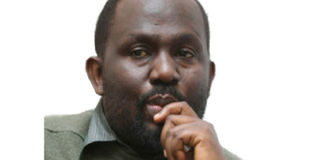We hear Museveni is playing chess against himself in State House

This was in the story in Daily Monitor, Monday, titled “Officials panic as Tanzania sways Museveni on SGR”.
“President Museveni will this week meet officials from the Works and Finance ministries to discuss progress on the Standard Gauge Railway (SGR) and plans HE CONCEIVED (caps mine) during a recent visit to Tanzania”, Daily Monitor has learnt.
“The President will expect the officials to table a comparative cost analysis of Uganda’s SGR in relation to Kenya and Tanzania’s costs...
“Sources say the officials were thrown into panic after Mr Museveni was told in Tanzania that the country’s planned SGR line was to cost significantly lower per kilometre than Uganda’s.”
It is striking that on all major infrastructure and economic projects, the President is virtually the only voice.
It seems that unless he puts his finger on it, the scale doesn’t shift. The decision, negotiations, and the announcement that Uganda would build its pipeline through Tanzania, not Kenya, came from the Horse’s mouth. That time, again, “Mzee” had travelled to Tanzania and ku-pangad things with president John Magufuli.
Most pronouncements on the SGR, have come from him.
Perhaps the President is a very hardworking man, and it’s good for a president to have such key projects on his checklist.
The problem is that it also seems to confirm the view, prevalent in recent years, that the rest of the Ugandan State has been disemboweled, and what some allege is a “parallel government” in State House has taken over all power.
The downside is that there is no vast meritocratic bureaucracy in State House running things. The “parallel government” is actually the “parallel man” - Museveni.
Take the case of the Shs6 billion “golden handshake” that was approved by the President to officials who helped Uganda fight its oil case in London.
I will not go into the merit of the payment, but the matter went to State House, where Museveni faced off a parliamentary committee that arrived with a head of steam, but unsurprisingly became a little subdued in the President’s presence, to explain why he had authorised the payment.
Shs6 billion is a lot of money, but it was still a bonus, really. I cannot conceive that a parliamentary committee would ever end up in State House Nairobi, to confront President Uhuru Kenyatta, over approving a bonus payment to state officials. With all the faults in Kenyan politics, that would actually be beneath him.
These kinds of things, were they to happen, would be handled at Treasury.
There is something amiss. It’s like oil, you get the impression that the way the President talks so intimately and personally about it as “my oil”, the most comprehensive map of the oil fields is probably locked in his bedside drawer.
We shall even grant the debatable point that some of this could come from Museveni’s determination, as he himself says, to ensure that Uganda gets the best deal from “his” oil.
However, cocooned away in State House, there are murmurs that the President is like one of those people who play a game of chess against themselves.
There is little headline grabbing movement on oil, and even SGR, because they have not been freed so that talented Ugandans are given permission to take some risks, and execute them.
Again let’s look at Kenya. Its SGR project has been dogged by political fights, big ones. Accusations that it has been hopelessly overpriced, and that a lot of fat has been built in for big people to chop, are galore.
Yet, amidst the blows the project has progressed. New world class train stations have been unveiled and are being built. Recently, the trains arrived, and they have done test runs.
With an election coming up, President Kenyatta is mindful to visit and take the publicity photographs with the gleaming new railway build in the background, but I have not read a story where he personally intervened to break a deadlock over the project.
Kenya is also building a new pipeline to Eldoret, and while it is not universally popular, we know work is being done because from time to time photos of pipeline being laid pop in the press.
I am surprised that Museveni only found out that Uganda’s SGR is more expensive than Tanzania’s after he had tea with Magufuli.
Dams, Internet backbone, and most projects are more expensive in Uganda than most other places in Africa. His press aides, who read foreign (and Tanzanian) newspapers and websites, would have told him that because every week there are dozens of stories about the costs of infrastructure around Africa.
But first, the people who know these things need to get a place at his table. Playing chess with someone else is infinitely more rewarding than playing against oneself.
Onyango-Obbo is the publisher of Africa data visualiser Africapedia.com and explainer site Roguechiefs.com. Twitter@cobbo3




